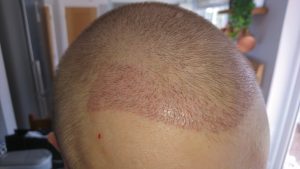Basically no. I’m sure you’ll be glad to hear. When you masturbate your testosterone levels rise temporarily, but then fall back down to normal levels almost immediately afterwards.
The same thing happens with most forms of exercise, particularly with compound movements like squats, or intense exertion like sprinting.
The argument is that continued fapping will ultimately raise the amount of testosterone in your body. This is simply not true. And even if it were true a raised testosterone level does not necessarily lead to increased 5a-Reductase activity.
And it’s this 5a-R activity that level that dictates how much of your testosterone is converted into Dihydrotestosterone (DHT), which is the testosterone byproduct that weakens your hair follicles.
Interestingly your 5a-R activity can increase naturally as you age, and your testosterone levels can dip.
If you want more evidence that masturbating does not cause hair loss to let’s look at the clinical studies.
There are none. There are no clinical studies that have been conducted to date that seek to determine what the long term effects of strumming one fiddle have on testosterone production.
You’ll find that most well-founded theories have various clinical studies attached to them. Such as suppressing 5a-R activity with drugs like Finasteride, or increasing blood flow with products like Minoxidil.
The Minoxidil market size is valued at $880 million a year. Hair loss products are big business, so if an argument is worth exploring you can bet some form of the clinical study will be conducted.
Lastly masturbating can actually be good for you, it certainly has no negative side effects. And abstaining can be bad for you. So crack on!
Alternative causes of hair loss
Alternative causes of hair loss include genetics, hormonal imbalances, certain medical conditions (such as thyroid disease or iron deficiency anemia), certain medications, and stress. Some of these causes may be identified through a combination of symptoms, physical examination, and lab tests.
Genetic hair loss, also known as androgenetic alopecia, is the most common cause of hair loss. It is characterized by a gradual thinning of hair on the scalp, and it is caused by a combination of genetics and hormones.
Hormonal imbalances, such as those caused by pregnancy, menopause, or certain medical conditions, can also cause hair loss. This type of hair loss is often temporary and can be treated with hormone replacement therapy or other medications.
Certain medical conditions, such as thyroid disease or iron deficiency anemia, can also cause hair loss. These conditions can be diagnosed through blood tests, and hair loss is usually one of many symptoms of the underlying condition.
Certain medications, such as blood thinners, birth control pills, and chemotherapy drugs, can also cause hair loss. This is usually a temporary side effect that can be reversed when the medication is discontinued.
Stress can cause hair loss by causing hair to enter the telogen phase of the hair growth cycle prematurely. This type of hair loss is usually temporary and can be treated by managing stress levels.
It is important to consult with a medical professional if you are experiencing hair loss to determine the underlying cause and the best course of treatment. A hair loss specialist or a dermatologist can help you to determine the cause of your hair loss and recommend the best course of treatment.
The importance of consulting a medical professional for hair loss concerns
Consulting a medical professional for hair loss concerns is important for several reasons.
First, a medical professional can help to determine the underlying cause of hair loss. This is important because different causes of hair loss require different treatments. For example, if hair loss is caused by a medical condition such as thyroid disease, treating the underlying condition will be necessary to stop the hair loss.
Second, a medical professional can help to rule out serious medical conditions that may cause hair loss as a symptom. Some medical conditions, such as lupus or polycystic ovary syndrome, may cause hair loss as a symptom, and early detection and treatment of these conditions can help to prevent serious complications.
Third, a medical professional can help to determine the appropriate course of treatment. For example, if hair loss is caused by a hormonal imbalance, hormone replacement therapy may be necessary. If hair loss is caused by a medication, switching to a different medication may be necessary.
Fourth, a medical professional can help to differentiate temporary hair loss from permanent hair loss. Temporary hair loss can be caused by a variety of factors such as stress, pregnancy, or certain medications, and it often resolves on its own. Permanent hair loss, on the other hand, requires long-term treatment.
Finally, a medical professional can help to prevent further hair loss and promote hair growth by providing individualized care and treatment plans. This may include prescribing medications, recommending lifestyle changes, or referring you to other specialists.
In summary, consulting a medical professional for hair loss concerns is important to determine the underlying cause, rule out serious medical conditions, determine the appropriate course of treatment, differentiate between temporary and permanent hair loss, and to prevent further hair loss and promote hair growth.



















